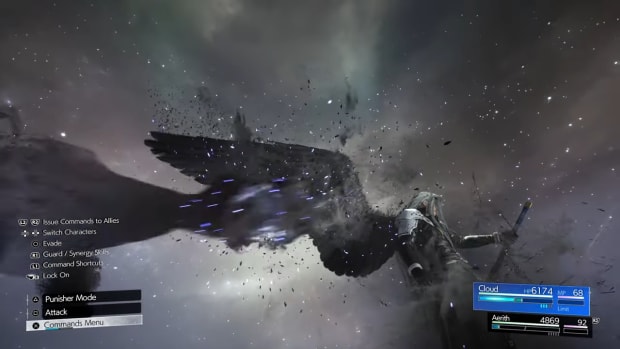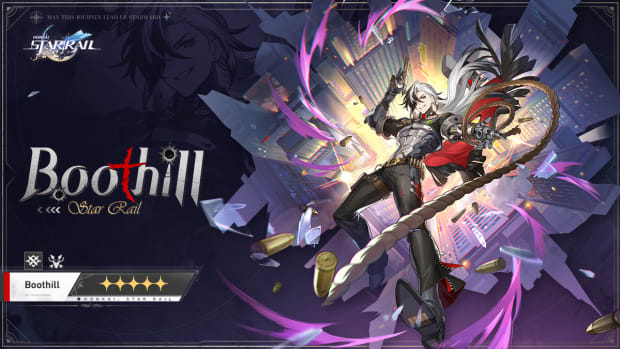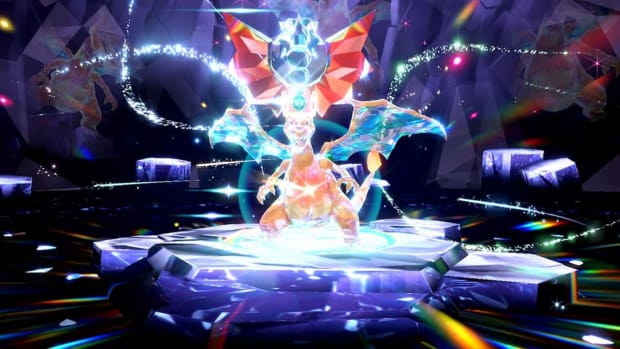
Inside the story of Assassin’s Creed Mirage
Ahead of the Assassin’s Creed Mirage release date of October 5, 2023, across PC and console, we sat down with the game’s narrative director Sarah Beaulieu to dig into its secretive story.
More condensed than its sprawling predecessor, 2019’s Assassin’s Creed Valhalla, Mirage takes place in 9th-century Baghdad, cutting out vast swathes of open-world sandbox and centering the action inside a single, densely detailed city. But as Beaulieu tells us, this change of direction did wonders for the narrative.
With a smaller scale to work with, Ubisoft’s dozen-strong writing team was free to tell a complete story from beginning to end - and that included writing the ending first. Plus, for players who would ordinarily struggle to finish one of Ubisoft’s gigantic tentpole releases, there’s more chance in Mirage’s shorter runtime of seeing a satisfying payoff.
Here’s our chat with Beaulieu in full. For more on the game, read our Assassin’s Creed Mirage hands-on impressions and our interview with AC Mirage lead producer Fabian Salomon.
GLHF: How are you approaching the story in this game?
Sarah Beaulieu: So at first we had to dig into what Basim was before in Valhalla. So as you know, it’s a prequel. We’re a few years before Valhalla, so we had to tell the story about an existing character. That was the beginning of digging into the narrative. And on the other side, we had the historical setting. So we build upon this and we dig into our literature and what was existing already about the setting. Baghdad especially. We slowly found out that there was this rebellion happening back in the days in Baghdad, slowly happening. This character called Ali ibn Mohammed that you may have seen in the story trailer is the leader of the rebellion. So we dug into history, we dug into Basim’s story in Valhalla and you know, mixing the two we slowly started to build the story.
What was the name of the rebellion?
The Zanj Rebellion. It’s a rebellion that happened against the caliphate from the population. Basically, slaves and slavers are angry against the caliphate, and it's mostly slaves coming from East Africa, but also people coming from the Middle East in general. So it was a global rising. And that's one of the things that caused Baghdad to fall, I would say, at some point. So it was the beginning of this rebellion.
It’s a single city rather than the wide countryside of Valhalla. Would it be fair to say this is smaller in terms of scope and scale than Valhalla?
Yeah, it is. If you want to just tackle the main story… it’s probably going to average at around 25 to 30 hours of gameplay. And if you want to wander around, doing all the activities and everything, it's going to be longer. But yeah, it's smaller in scope. That was a very, very core intention for us. Something smaller, something more condensed and something more narrative where we can tell a story from the beginning to the end, which is also the case in Valhalla, but in a very different way. Because if you experience it, you play Valhalla for so many hours, so you know that the story is dispatched in many ways and it's a bit more floating, I would say, in terms of narrative.
So because the world is so big, it's harder to tell a story in a very condensed way. What we did is we took the open world of Valhalla and the Mirage preview we’ve shown, which includes a part of the beginning that’s very linear, and then you have the open world, which is the city and the surroundings of Baghdad, and you can wander where you want, just like you did in Valhalla. Some people will call that a world event when you cross an NPC and something happens and you can actually look into it if you want – and different side quests and everything, and then you have a very linear ending. So we took both of the worlds and mixed that.
What are you taking from past games in the series like Valhalla and Odyssey and what lessons are you learning that you're bringing into Mirage?
Basically what I just said in terms of narrative, in terms of gameplay, we went closer to the first axis, so we brought back some features and we wanted to emphasize the stealth, mostly the parkour, the assassination. But for focusing on the Black Box missions, that's the moment when you actually enter a place and it's a very specific bit of quest where you have to kill a target and you have to be stealthy, sneaky, and find your way in to kill the target. That’s something we actually took from the first Assassin’s Creed. Our inspiration comes mostly from the first Assassin’s Creed for that reason.
What would be your dream setting for an Assassin’s Creed game?
Actually, my dream location was already made. It would have been London. But, you know, things can happen.
This game explores Basim even though he’s been in a previous game so is there scope to explore London again?
That’s something I can’t say, obviously, but yeah, it's a tricky question because it’s not saying anything about what we could do or not do in the future. I’m really into games where you can explore small cities and small environments, but deeply, with a lot of different stories in there – and very vibrant cities like Baghdad.
Are there any games that spring to mind that you enjoy?
Actually, I’m more of an indie person, so I like indie games most of all. The last one I enjoyed was Dredged. It was nice. I played a lot of Little Nightmares preparing for the third one to come. I played a lot of Spiritfarer, tiny games, more condensed games. That’s the player I am.
Is there any crossover between those games and Assassin’s Creed? Are you bringing any kind of affection for those indie games into this game?
I think so, in a way, because as I told you just before, the fact that there are a lot of different small stories in a city like Baghdad is something that I enjoy in other smaller games: you can experience different characters, different moods, in the same small environment. So yeah, something like that would be one of them. But also, the linear thing, the fact that you can experience the story from the beginning to the end and see the character evolving.
That’s very dear to my heart as a player and as a writer, too, because I like to be with the character and be the character for a certain amount of time. The fact that we have a condensed narrative and a condensed story with a clear ending is something that was key to the narrative from the beginning of the project.
Speaking of which, how does the character change from the Basim at the start to the Basim we get at the end? What's the progression there?
Not spoiling anything, but Basim is kind of candid [at the beginning]. Slowly, as he’s brought into the hidden ones, he tries to do his best and he tries to do the right things – what he thinks are the right things – but he's divided between Roshan, who is the mentor, also one of the hidden ones, and Nihal.
That’s his best friend. And other characters who actually feed back to him as a character and slowly guide him through his fate. But if you’ve played Valhalla, you know what he becomes and it’s a tragedy. Obviously, we're not telling a funny story. So as a player, you feel that evolution, you feel that you're evolving as an assassin, just like Basim is evolving. It's key to have a similar objective [for] the player and the character [so] that you can actually experience the evolution of the character. As you know, Basim is not going to end up well.
Do you have a gameplay feature or detail you’re proud of that you would like to make players aware of? Even just a specific sentence.
There’s a lot of sentences that I like, but it’s not always the sentences that I wrote. We have a bunch of great writers, very talented writers. But the thing I think I'm the most proud of is actually the ending scene. That's the very last one. And I'm not saying that just so players would go until the end just to see it.
I don’t know if you saw Jean-Luc’s presentation but he had this ‘mother of images’, as he called it. It’s the concept art that was embodying his vision as an art director. What I had was the last scene, because that's the first one I wrote for the game, [as] I knew I wanted this scene to be the last one. Because that embodied what Basim was and what he was about to begin. So that was a very key scene. The mother of all scenes.
It’s quite pivotal then?
Yeah. I said it earlier, but it’s a game that has a lot of subtext. Not everything is easy to understand and you have to dig into stuff, you have to maybe discuss with other people in the community to understand some of the things. It’s a lot about collective intelligence and fitting the lore. But also I hope that people will dig into it and understand stuff and think about it. And they interpret stuff because that's the way it was written.
The stories are a huge part of Assassin’s Creed. People like dissecting it and deconstructing it. And it makes me want another Assassin’s Creed movie. Is the door closed on ever revisiting that?
Yeah, that’s something I can’t even say because that's secret.
Would you like to write an Assassin’s Creed movie one day?
An Assassin’s Creed movie? I mean, I come from movies, so I wrote some stuff. So, yeah, definitely. That would be something I would like.
This game is very historically accurate. You got a lot of consultants and historians, the Arabic language mode, etc. Would you say it's the most well-researched game in the series?
I don’t know, because I wouldn't dare challenge the work of the previous historians in other games… We were always very keen to do something respectful of the culture of that time, and we’ve been digging into history and finding out that we don’t learn about 9th-century Baghdad at school at all. People sometimes know a lot about Greece, about Rome, about these kinds of settings, but nothing about the Middle East.
So when we actually started working on the game, authenticity was a word that was coming up a lot and also being respectful. We had a team inside Ubisoft, along with the historians; an authenticity team. People who speak Arabic, who can make sure that what we say, what we do in the game is respectful [and] accurate. It was very important for us. Even the work with the actors was very important to us because what we call the master actors – that’s the master voices, the English ones – we wanted to make sure that all the actors that were doing the master voices were actually from the Middle East.
We have Chinese characters. We wanted people who could [perform] a decent and real Chinese accent. It's the same thing for all the characters – Turkish accents and Arabic accents, obviously. They had coaches when they needed to. We paid attention to that. We paid attention to the way the words were raised and all these details to make sure that it was very authentic. So I don't know if we did more than the other games, but we tried our best to be authentic and respectful.
To give readers a sense of what your personal role is, can you give a few examples of what you’ve written in the game?
Well, everything. If you want to have a wide view of how it works at Ubisoft, we have directors for each department. So, for example, you have the game director, you have the quest director, art director, etc. So we have 13 departments. In my department, which is narrative, what we do is we set up the whole story. I say ‘we’ because I'm the director, but we have lead writers, actually three lead writers and nine writers. The lead writers also write. And what we do, is we work together on the main story, on everything that happens around… We work very closely with the quest director, so everything about quests. So that's how you build a quest around a storyline and how things are going to be playable.
[This] is how you make sure that the mechanics of the game and the narrative are intertwined and actually work together and feed each other. So that’s a very transversal department, narrative, because it involves all the other departments. For example, audio: we're always with the audio team and we worked with them on what we could do in terms of building a living city with people talking different languages and what they are doing in there.
The House of Wisdom, which is one of the main settings in Baghdad. We talked about that with Jean Luc, [our] art director, and we wanted to make sure that it was at the center of the game at some point. So we made a quest just for that specific location. So we worked together, and it’s very collaborative and iterative and everything. So yeah, narrative is very transversal.
Assassin’s Creed Mirage is out October 6, 2023, for PC, PS5, Xbox Series X|S, PS4, and Xbox One.









